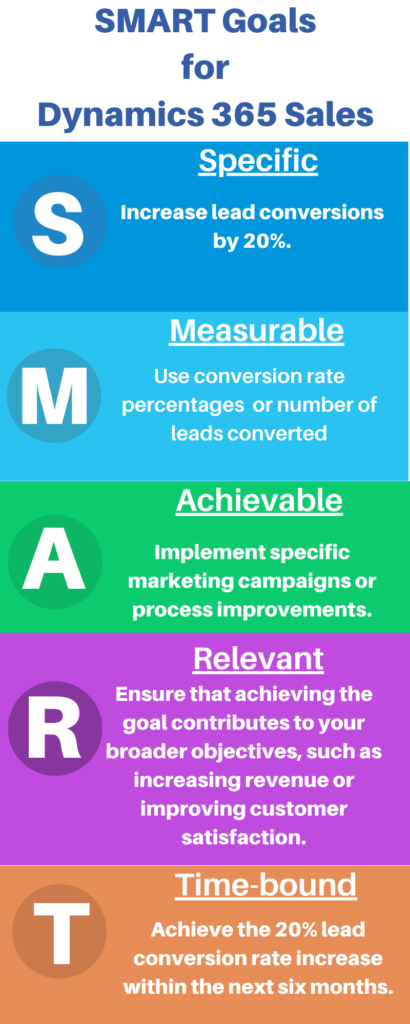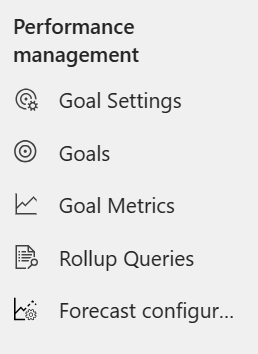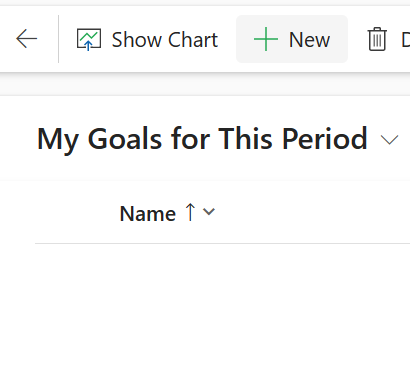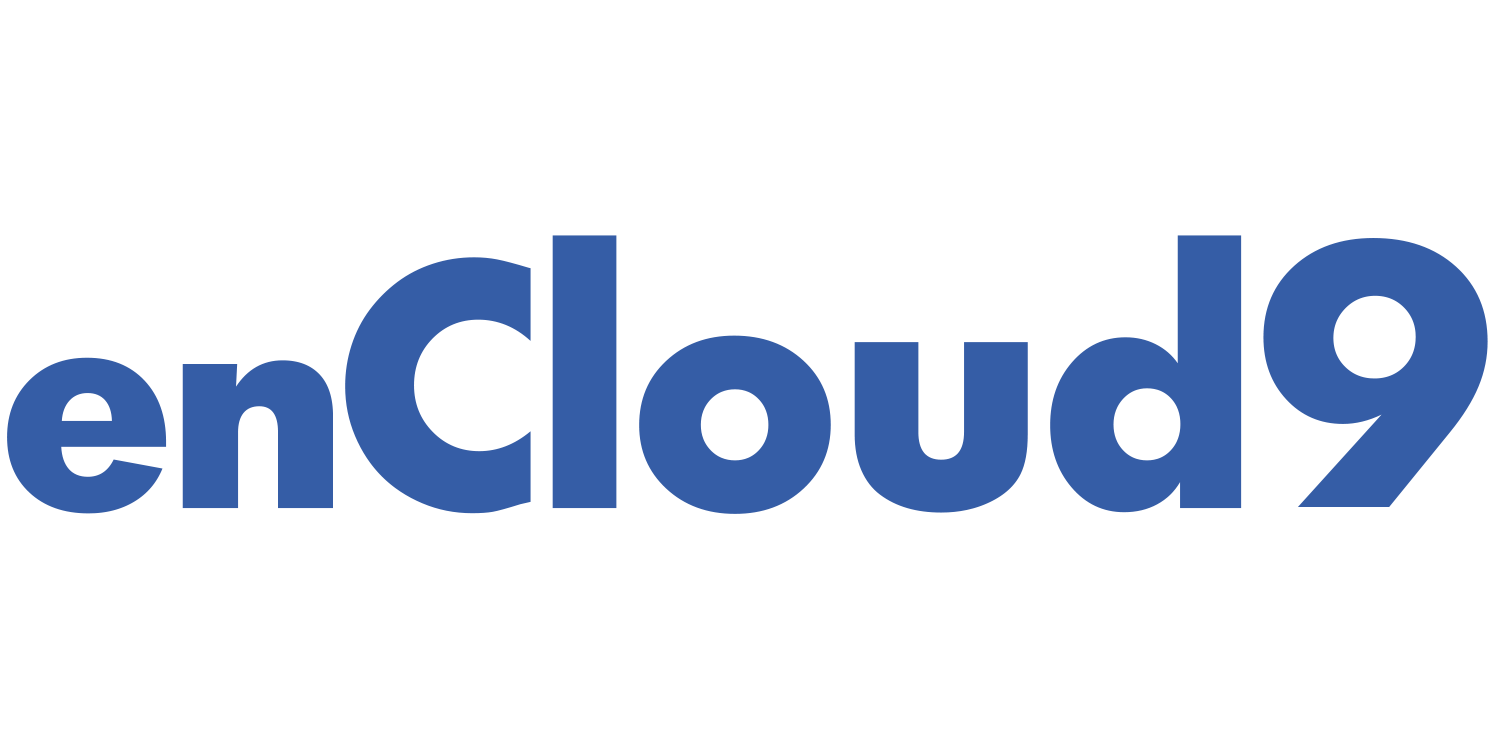In today’s fiercely competitive business landscape, effective customer relationship management (CRM) tools have become indispensable for organizations aiming to nurture robust customer relationships and drive sustainable growth. Microsoft Dynamics 365, a comprehensive CRM platform, offers a diverse array of features and functionalities to assist businesses in realizing their goals. In this comprehensive guide, we will take you through the process of defining SMART CRM goals using Dynamics 365.
Understanding SMART Goals
Before diving into using Dynamics 365 for crafting SMART CRM goals, let’s first clarify what SMART goals are:
1. Specific Goals: “Your goals should be crystal clear and to the point, leaving no room for ambiguity. They should effectively answer the question, ‘What exactly needs to be done?'”
2. Measurable Objectives: Your goals should be measurable, making it easy to track progress and know when you’ve achieved them.
3. Achievable Targets: Goals should be realistic and within reach, considering the available resources and timeframe.
4. Relevant Milestones: Goals should align closely with your organization’s bigger objectives and directly relate to your CRM strategy.
5. Time-bound Deadlines: Each goal should have a well-defined timeframe or deadline within which it should be accomplished. This timeframe provides a sense of urgency and accountability.
Now that we have underscored the significance of SMART goals, let’s explore how Dynamics 365 can be harnessed to create them:

Step 1: Defining the Purpose of Your SMART CRM Goals
Before you start setting goals, it’s important to get a clear understanding of why you’re doing it. Identify the areas in your CRM strategy that need improvement or enhancement. Are you looking to improve customer retention, increase sales, or enhance customer support? Clarify the main reason behind your SMART goals to make sure they align well with your organization’s core objectives.
Step 2: Identifying Specific CRM Metrics
To make goals specific, pinpoint the key metrics or indicators that will measure success. For example, if you’re aiming to boost sales, a specific metric could be the number of new customers acquired in a set time frame. With Dynamics 365, you have access to various data and reporting tools that make it easier to find and keep tabs on these metrics.
When considering data, keep in mind that improved data leads to more effective sales metrics. Thanks to the growing presence of business intelligence, small and medium-sized businesses, as well as managers and owners, have had the opportunity to make the most of enhanced data. One area that has greatly benefited from this surge in business intelligence is sales. Given the abundance of sales-related metrics available, selecting the ones that will work best for your business can be quite a challenge. To aid in your selection process, we have written a blog article titled 5 of the Most Common Tracked Sales Metrics.
Step 3: Establishing Measurable SMART Targets
After identifying the specific metrics, it’s time to set measurable targets that provide a clear benchmark for measuring success. For example, if your goal is to enhance customer satisfaction, you could set a target like reaching a minimum customer satisfaction score of 90% within six months.
Dynamics 365 provides the capabilities to craft custom fields and perform precise calculations, ensuring the accurate tracking of these metrics.
Step 4: Assessing Achievability within Dynamics 365
Now, you must determine whether your SMART goals are realistically attainable. Factors such as workforce availability, technological capabilities, and budgetary considerations should be taken into account.
Dynamics 365 can help by looking at past data and telling you if similar goals have worked before or if you need to make some changes.
Step 5: Ensuring Relevance of CRM Objectives
Importantly, your goals should match your CRM strategy and play a direct role in achieving your organization’s CRM objectives. For instance, if your main focus in CRM is improving customer support, setting a goal related to product development might not be the best fit. SMART goals are a crucial component of your overall CRM strategy’s success.
Step 6: Defining Timeframes within Dynamics 365
Every SMART goal should have a clear deadline to create a sense of urgency and responsibility.
With Dynamics 365, you can pick start and finish dates for your goals, which helps you stay organized in reaching them. For instance, if you want to boost lead conversions by 20%, you can set a six-month timeframe right in the system.
Step 7: Creating Goals in Dynamics 365
Now that you’ve defined your SMART goals, it’s time to bring them to life in your Dynamics 365 environment. Here are 8 easy steps:


- Navigate to the “App Settings” menu in Dynamics 365 Sales, and under “Performance Management” select “Goals.”
- Create a goal by clicking on “New.”
- Give the goal a fitting name that perfectly describes what it’s all about. For example, you could call it “Boosting Customer Loyalty.”
- Determine the metric that will be monitored, such as “Customer Retention Rate (%).”
- Define the target value for the metric, for example, “Achieve a 10% increase in Customer Retention Rate.”
- Set the start and end dates for the goal, marking when it begins and when it should finish.
- Skillfully assign the goal to the teams or people responsible for making it happen.
- Save the goal settings, so it becomes one of the active goals in Dynamics 365.
Step 8: Ongoing Progress Monitoring in Dynamics 365
Once you’ve created your SMART goals, it’s essential to keep an eye on how things are going and make any necessary changes. Dynamics 365 is here to help with real-time dashboards and detailed reports that make it easy to track your goals closely. These tools let you see how your goals are progressing and check if you’re still on the right track to reach them.
Step 9: Result Analysis
Once your SMART goals are determined and set up, it’s time to analyze the results. Did you reach your goals successfully, or did you face some challenges? It’s crucial to think about what worked well and what might need some tweaks.
With Dynamics 365’s strong reporting and analysis tools, you can gain valuable insights into how your CRM efforts performed. Using these insights, you can smartly adjust your goals and start fresh on the path of SMART goal-setting, making them fit smoothly with the changing shape of your CRM strategy.
Elevating CRM Excellence with Dynamics 365
By setting SMART CRM goals within Dynamics 365, you’re strategically setting yourself up for success in your customer relationship management efforts. This step-by-step guide has given you essential insights to ensure your goals are Specific, Measurable, Achievable, Relevant, and Time-bound.
Remember that effective goal setting is an ongoing journey, marked by constant monitoring, thoughtful adjustments, and a relentless pursuit of CRM excellence. As you follow this path, with Dynamics 365 as your CRM partner, you have the technological tools and resources needed to stimulate growth and cultivate long-lasting customer relationships.
Goals can be a very important piece of the puzzle for any organization, as goals can be used for compensation, bonuses, or even advancement within the company. Dynamics 365 Goals allow organizations to set sales, service, marketing, and other business goals for their company and then measure the results against targets.
Further Learning
For more information about why organizations should use goals and how Dynamics 365 Goals help organizations stay on target, visit our blog. Some people are easily intimidated and think it might be difficult to configure Goals in Dynamics 365, but really it is not. We have written a blog on How to Configure Goals in Dynamics 365.
How can we assist you?
If your goal is to meet and exceed your sales targets, Reach out to the marketing experts at enCloud9. In addition, to marketing goals, Microsoft Dynamics 365 is the ideal solution to ensure your success. It reigns supreme as the primary tool for businesses embarking on digital transformation journeys. Let’s explore how we can help you harness the full potential of Dynamics 365 for your sales endeavors.
Our extensive experience in assisting businesses with digital transformations can make a substantial difference in your sales strategy. Visit our website to delve into our Success Stories, showcasing how we’ve enabled other businesses to realize their digital transformation aspirations. For insights into the critical role of digital transformation in today’s market landscape, download our whitepaper. Contact enCloud9 today to explore how you can experience ongoing success in your Dynamics 365 journey. You could be our next success story.
As we approach 2024, it’s the perfect time to wrap up the year on a high note with your sales and marketing teams. Make sure your team stays committed, keeps their eyes on the goals, and is ready for a successful new year by following our 2024 Sales Checklist, fortified by the capabilities of Dynamics 365.
In this blog post, we’ve stressed the significance of goal-setting. Another article you might find valuable is: Driving Success: The Role of Year-End CRM Reviews in Dynamics 365
About enCloud9
enCloud9 is a top-notch Microsoft Solution Partner for Business Applications. We’re known for harnessing the powerful features of the Microsoft stack. Our team of certified experts focuses on helping small to medium-sized businesses improve customer interactions, boost sales, and simplify marketing. We’re committed to excellence, put customers first, and have deep industry knowledge, making us the go-to option for businesses looking for digital transformation solutions.


